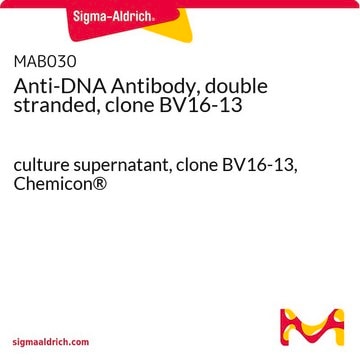04-1540
Anti-PICH Antibody, clone 142-26-3
clone 142-26-3, from mouse
Szinonimák:
excision repair cross-complementing rodent repair deficiency, complementation group 6-like, excision repair cross-complementing rodent repair deficiency complementation group 6 - like, Tumor antigen BJ-HCC-15, PLK1-interacting checkpoint helicase, ATP-de
About This Item
Javasolt termékek
biológiai forrás
mouse
Minőségi szint
antitest forma
purified immunoglobulin
antitest terméktípus
primary antibodies
klón
142-26-3, monoclonal
faj reaktivitás
human
technika/technikák
immunocytochemistry: suitable
immunoprecipitation (IP): suitable
western blot: suitable
izotípus
IgG1κ
NCBI elérési szám
UniProt elérési szám
kiszállítva
wet ice
célzott transzláció utáni módosítás
unmodified
Géninformáció
human ... ERCC6L(54821)
Általános leírás
Egyediség
Immunogen
Alkalmazás
Immunocytochemistry Analysis: A representative lot was used by an independent laboratory in IC.
Epigenetics & Nuclear Function
Cell Cycle, DNA Replication & Repair
Minőség
Western Blot Analysis: 0.1 µg/mL of this antibody detected Plk1-interacting checkpoint helicase on 10 µg of HeLa-S3 cell lysate.
Cél megnevezése
Fizikai forma
Tárolás és stabilitás
Analízis megjegyzés
HeLa-S3 cell lysate
Egyéb megjegyzések
Jogi nyilatkozat
Nem találja a megfelelő terméket?
Próbálja ki a Termékválasztó eszköz. eszközt
Tárolási osztály kódja
12 - Non Combustible Liquids
WGK
WGK 1
Lobbanási pont (F)
Not applicable
Lobbanási pont (C)
Not applicable
Analitikai tanúsítványok (COA)
Analitikai tanúsítványok (COA) keresése a termék sarzs-/tételszámának megadásával. A sarzs- és tételszámok a termék címkéjén találhatók, a „Lot” vagy „Batch” szavak után.
Már rendelkezik ezzel a termékkel?
Az Ön által nemrégiben megvásárolt termékekre vonatkozó dokumentumokat a Dokumentumtárban találja.
Tudóscsoportunk valamennyi kutatási területen rendelkezik tapasztalattal, beleértve az élettudományt, az anyagtudományt, a kémiai szintézist, a kromatográfiát, az analitikát és még sok más területet.
Lépjen kapcsolatba a szaktanácsadással








